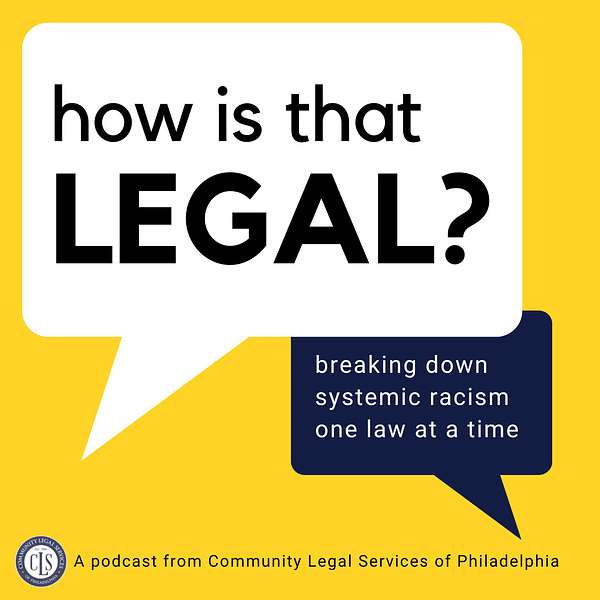
How Is That Legal?: Breaking Down Systemic Racism One Law at a Time
How Is That Legal?: Breaking Down Systemic Racism One Law at a Time
Coming Soon: How Is That Legal?
How many times have you encountered an injustice that shocked you so much that you wondered, “How in the world could this possibly be legal?”
Well, that’s exactly why we at Community Legal Services of Philadelphia created our new podcast, How Is That Legal. With help from our host, CLS Chief Equity and Inclusion Officer Kee Tobar, expert guests will break down specific examples of systemic racism in the law and policy and share how we can all work together to build a future free of injustice. As a queer Black woman from a working class background, native southerner, and legal aid attorney, Kee brings a grounded perspective and fierce commitment to dismantling legalized racism to every interview. Airing weekly on Wednesdays.
If you enjoy this show and want to help fight poverty and injustice, consider making a donation to Community Legal Services today! You can also follow us on Twitter @CLSphila to stay connected.
How Is that Legal is produced by Rowhome Productions. Jake Nussbaum is our Producer and Editor. Executive Producers are Alex Lewis and John Myers. Special thanks to Caitlin Nagel, Zakya Hall, and Molly Pollak. Music provided by Blue Dot Sessions.
Kee Tobar:
Hello, everyone. I'm Kee Tobar. I'm a civil legal aid attorney, history enthusiast, and Chief Equity and Inclusion Officer at Community Legal Services of Philadelphia. Welcome to How is That Legal? The podcast where we break down examples of systemic racial inequity in the law and policy and talk to experts whose stories of injustice will make you ask, "How in the world is that legal?"
Kee Tobar:
As a queer Black woman, I've looked at the world around me and asked myself the question, "How is that legal?" for pretty much my entire life. I grew up in the Delta South to a working class, single parent and as early as seven years old, I knew in my gut that our financial circumstances were immoral at worst and inequitable at best. For example, my mom woke up every morning, Monday through Friday at 5:00 AM to make it to work in the next town over at 6:00 AM. For her dedicated eight hours of work in a lamp factory, she received $5 an hour. That meant a gross pay of $200 a week and $800 a month. With this $800 a month, she had to find housing big enough for a family of five and cheap enough to have money left over to cover utilities and other necessary bills.
Kee Tobar:
At the time, my small town did not have public housing. Ultimately, the housing that was accessible for my family was a small two bedroom trailer with $150 a month rent. There were countless issues with the home, including a large hole in the ceiling next to the kitchen that leaked every time it rained. We tried our best to make the trailer a home, after all, we weren't the only people living with these circumstances. Half the town lived in trailer similar to ours, so although it felt unfair, I accepted it as fact of life. That example is just one instance of me wondering how certain circumstances were legal, but as a queer Black woman from a working class background, those queries have never stopped. From that trailer in Arkansas to practicing law as a legal aid attorney in Philadelphia, I have never stopped trying to understand and then explain to others how certain circumstances are legal for certain people and why that is so.
Kee Tobar:
As a civil legal aid attorney at Community Legal Services of Philadelphia, I help fight egregious examples of injustices in the civil legal system. CLS advocates help clients when they face the threat of losing their homes, incomes, healthcare, and even their families, oftentimes for no other reason than being poor or Black or brown or immigrant or the intersections thereof. We know that's true and yet and still it's difficult to get to the bottom of these disparities. I mean, really? How is the whole system legal?
Kee Tobar:
If you're still listening, I suspect you have the same questions. How is it legal that more than one in 10 Black children in America will be forcibly separated from their parents and placed in foster care by the time they reach age 18? How is it legal that an eviction filing, not even a determination, can disproportionately lock Black women and their children out of housing opportunities indefinitely? How is it legal to snatch away a family's opportunity for generational wealth through home ownership due to a decades past unpaid water bill? Well, that's exactly why we started this podcast, to break down the specific ways the legal system perpetuates racial inequity and do so in a way that you can understand. Our expert guests come from a wide range of backgrounds and experiences. They'll walk us through history and put names to the laws and policies that create the disparities we see every day but I promise not to leave you stuffed with knowledge and without solutions. We'll also talk about what's currently being done and what must be done to create a world free of injustice and that's the part I'm really excited about. It's a conversation you won't want to miss. So be sure to subscribe to How is That Legal wherever you get your podcast.
Kee Tobar:
How is That Legal is produced by Rowhome Productions. Jake Nussbaum is our producer and editor, executive producers are Alex Lewis and John Myers. Music provided by Blue Dot Sessions. Special thanks to Zakya Hall, Caitlin Nagel, and Molly Pollak. I'm your host Kee Tobar.
